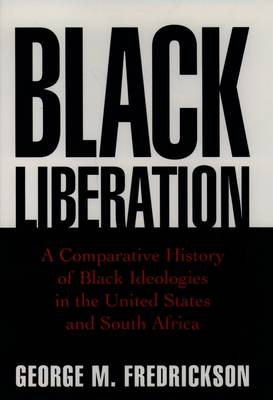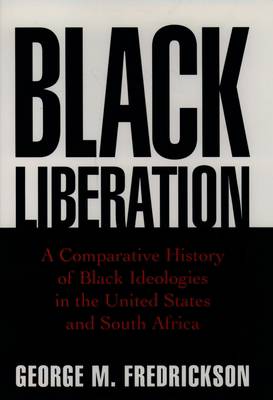
En raison d'une grêve chez bpost, votre commande pourrait être retardée. Vous avez besoin d’un livre rapidement ? Nos magasins vous accueillent à bras ouverts !
- Retrait gratuit dans votre magasin Club
- 7.000.000 titres dans notre catalogue
- Payer en toute sécurité
- Toujours un magasin près de chez vous
En raison de la grêve chez bpost, votre commande pourrait être retardée. Vous avez besoin d’un livre rapidement ? Nos magasins vous accueillent à bras ouverts !
- Retrait gratuit dans votre magasin Club
- 7.000.0000 titres dans notre catalogue
- Payer en toute sécurité
- Toujours un magasin près de chez vous
Black Liberation
A Comparative History of Black Ideologies in the United States and South Africa
George M Fredrickson
83,95 €
+ 167 points
Description
When George M. Fredrickson published White Supremacy: A Comparative Study in American and South African History, he met universal acclaim. David Brion Davis, writing in The New York Times Book Review, called it "one of the most brilliant and successful studies in comparative history ever written." The book was honored with the Ralph Waldo Emerson Prize, the Merle Curti Award, and a jury nomination for the Pulitzer Prize. Now comes the sequel to that acclaimed work.
In Black Liberation, George Fredrickson offers a fascinating account of how blacks in the United States and South Africa came to grips with the challenge of white supremacy. He reveals a rich history--not merely of parallel developments, but of an intricate, transatlantic web of influences and cross-fertilization. He begins with early moments of hope in both countries--Reconstruction in the United States, and the liberal colonialism of British Cape Colony--when the promise of suffrage led educated black elites to fight for color-blind equality. A rising tide of racism and discrimination at the turn of the century, however, blunted their hopes and encouraged nationalist movements in both countries. Fredrickson teases out the connections between movements and nations, examining the transatlantic appeal of black religious nationalism (known as Ethiopianism), and the pan-Africanism of Du Bois and Garvey. He brings to vivid life the decades of struggle, organizing, and debate, as blacks in the United States looked to Africa for identity and South Africans looked to America for new ideas and hope. The book traces the rise of Communist influence in black movements in the two nations in the 1920s and '30s, and the adoption of Gandhian nonviolent protest after World War II. The story of India's struggle, however, was not to be repeated in either America or South Africa: in one nation, nonviolence revealed its limitations, encouraging splits in the civil rights movement; in the other, it failed, fostering an armed struggle against white supremacy. Fredrickson brings the story up through the present, exploring the divergence between African-American identity politics and the nonracialism that has triumphed in South Africa.
In a career spanning thirty years, George Fredrickson has won recognition as the leading scholar of the struggle over racial domination in the United States and South Africa. In Black Liberation, he provides the essential companion volume to his award-winning White Supremacy, telling the story of how blacks fought back on both sides of the Atlantic.
In Black Liberation, George Fredrickson offers a fascinating account of how blacks in the United States and South Africa came to grips with the challenge of white supremacy. He reveals a rich history--not merely of parallel developments, but of an intricate, transatlantic web of influences and cross-fertilization. He begins with early moments of hope in both countries--Reconstruction in the United States, and the liberal colonialism of British Cape Colony--when the promise of suffrage led educated black elites to fight for color-blind equality. A rising tide of racism and discrimination at the turn of the century, however, blunted their hopes and encouraged nationalist movements in both countries. Fredrickson teases out the connections between movements and nations, examining the transatlantic appeal of black religious nationalism (known as Ethiopianism), and the pan-Africanism of Du Bois and Garvey. He brings to vivid life the decades of struggle, organizing, and debate, as blacks in the United States looked to Africa for identity and South Africans looked to America for new ideas and hope. The book traces the rise of Communist influence in black movements in the two nations in the 1920s and '30s, and the adoption of Gandhian nonviolent protest after World War II. The story of India's struggle, however, was not to be repeated in either America or South Africa: in one nation, nonviolence revealed its limitations, encouraging splits in the civil rights movement; in the other, it failed, fostering an armed struggle against white supremacy. Fredrickson brings the story up through the present, exploring the divergence between African-American identity politics and the nonracialism that has triumphed in South Africa.
In a career spanning thirty years, George Fredrickson has won recognition as the leading scholar of the struggle over racial domination in the United States and South Africa. In Black Liberation, he provides the essential companion volume to his award-winning White Supremacy, telling the story of how blacks fought back on both sides of the Atlantic.
Spécifications
Parties prenantes
- Auteur(s) :
- Editeur:
Contenu
- Nombre de pages :
- 400
- Langue:
- Anglais
- Collection :
Caractéristiques
- EAN:
- 9780195109788
- Date de parution :
- 31-10-96
- Format:
- Livre broché
- Format numérique:
- Trade paperback (VS)
- Dimensions :
- 155 mm x 234 mm
- Poids :
- 557 g

Les avis
Nous publions uniquement les avis qui respectent les conditions requises. Consultez nos conditions pour les avis.






